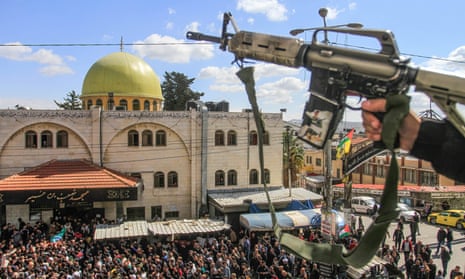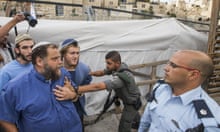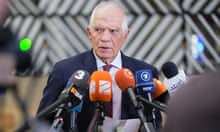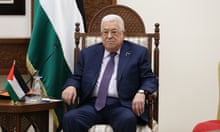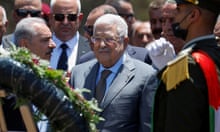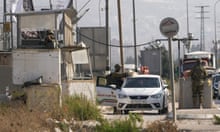The streets of the occupied West Bank city of Jenin were awash with black-clad men wearing balaclavas and toting M-16 rifles, a model apparently favoured because the ammunition is cheap. The crack of near-constant gunfire was deafening, almost drowning out chants of: “We will teach Tel Aviv a lesson.”
On Wednesday, the bodies of two militants killed in an Israeli army raid the day before were wrapped in Palestinian flags and carried through the centre towards the refugee camp on the city’s western edge. The huge number of armed men, and the mingling of flags belonging to several different militias – Hamas, Fatah and Palestinian Islamic Jihad – spoke to a new dynamic in the Israeli-Palestinian conflict.
In defiance of the West Bank’s semi-autonomous governing body, the Palestinian Authority (PA), armed resistance to the Israeli occupation is growing, and the boundaries between factions are blurring as their interests begin to merge.
“The PA are against us, they arrest and torture us. They sold out for money while we protect this land with our blood,” said a 25-year-old wearing a silver headband and the insignia of Fatah’s al-Aqsa Brigades, who spoke on the condition he was not named. “I have come from Nablus today to support our brothers. We face the occupation wherever it is. You can see by our numbers, look how many are here today. For every martyr they kill, 10 take his place.”

Six men – three affiliated with Hamas, one from Islamic Jihad, one from Fatah, and one man who was apparently a defecting member of the PA’s security forces – were killed in a rare daylight Israel Defence Forces (IDF) raid on Jenin camp on Tuesday afternoon targeting the Palestinian gunman who killed two Israelis in the West Bank town of Huwara last week. That attack had triggered a revenge rampage by nearby settlers living illegally on Palestinian land that even IDF officials described as a “pogrom”.
At the scene of the fighting, a car had slammed into the front of the targeted house, its bonnet crumpled like paper; witnesses said a shoulder-launched rocket fired by Israeli troops had thrown it forward by several metres, as well as blasting iron gates off their hinges and sending breezeblocks from destroyed walls tumbling to the ground.
Pools of dark red blood, still wet, shimmered in the sunlight. Inside the building, the orange and white kitchen, remarkably intact, looked at odds with the carnage on the other side of the missing living room wall.
“When we heard the soldiers shouting in Hebrew, we knew a raid was starting,” said 30-year-old Islam Fayed, who lives next door.
“We are worried about the impact of all of this on the children. They don’t sleep any more, they keep waking up from nightmares.”
Last spring, the IDF launched Operation Breakwater, a campaign of near-nightly raids across the West Bank mainly targeting the northern cities of Jenin and Nablus, in response to a wave of Palestinian terror attacks in Israel. A year later, not only have terrorist attacks targeting Israeli civilians increased, but the campaign’s soaring Palestinian death toll has galvanised a new generation of Palestinian fighters.
“We currently see the operation as a success in terms of preventing hundreds of terror attacks on Israeli civilians and thwarting potential threats. We do this by acting on precise intelligence alerting us to urgent threats,” said Lt Col Richard Hecht, the IDF’s international spokesperson.
“If the terrorism stops - we will be able to reduce the amount and frequency of activities and apprehensions.”
Signs are emerging that the groups of young men who organised in their home towns to fight back against the Israeli incursions are beginning to coordinate across different cities: that the Huwara shooter, a Hamas member from Nablus, chose to hide out in Jenin’s refugee camp, where he was sheltered by local fighters, suggests those links are strengthening. Such coordination lays the groundwork for a return to full-scale conflict with Israel, even if the PA, and half of its divided ruling Fatah faction, is against it.
Overnight in both Nablus and Jenin, imams broadcast a message from Palestinian prisoners in Israeli jails asking the people to rise up together in solidarity, a missive met with cheers and fireworks. The two cities, as well as the West Bank’s administrative capital, Ramallah, observed a general strike on Wednesday in protest against the militants’ deaths in Jenin – the kind of collective action the weak and corrupt PA can only dream of inspiring.
For the residents of these cities, war has already returned. About 70 Palestinians have been killed by Israeli forces so far in 2023, around half militants and half civilians, according to rights groups. Over the same period, Palestinian “lone wolf” attacks have killed 14 Israelis, all but one of them civilians. The bloodshed follows 2022, which was the deadliest year on record in Israel, Jerusalem and the West Bank since the second intifada, or Palestinian uprising, in the 2000s.
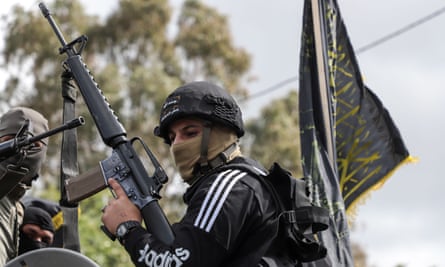
“I think this is worse than the second intifada. Now, every time [the Israelis] enter, they kill. They don’t distinguish between civilians and militants,” said Nadja, a 55-year-old resident of Jenin camp.
Originally a shelter for Palestinians who fled their homes during the war surrounding Israel’s creation in 1948, Jenin camp today, along with 18 others like it across the West Bank, resembles a ghetto: jobs are scarce, guns are plentiful, and resistance to the occupation has always been strong.
The PA was only ever supposed to be a temporary institution, created during peace talks in the 1990s. Thirty years later, it has done nothing to improve living standards here. If anything, recently matters have become worse, as the Israeli army has secured agreement to find the militants the PA’s own forces are too weak, or ambivalent about, to apprehend themselves.
As the Palestinian death toll steadily climbs, and settlers commit violence like that seen in Huwara with impunity, the little respect the PA still enjoys is evaporating. In videos circulated on social media on Tuesday night, frustrated Palestinians praised what they described as “the heroism of the martyrs”, while berating the PA as collaborators.
The near future does not bode well. The holy Muslim month of Ramadan, when tensions often boil over, starts on 23 March. Itamar Ben-Gvir, the extremist national security minister in Israel’s new far-right government, appears likely to pour fuel on the fire during the febrile period by pushing ahead with orders to demolish Palestinian homes in occupied East Jerusalem and visiting the city’s sensitive Temple Mount complex.
“I am not afraid to die,” a 20-year-old fighter from the camp said. “There is no life here anyway. Every day, there are incursions by the army or the PA, and people die.”
